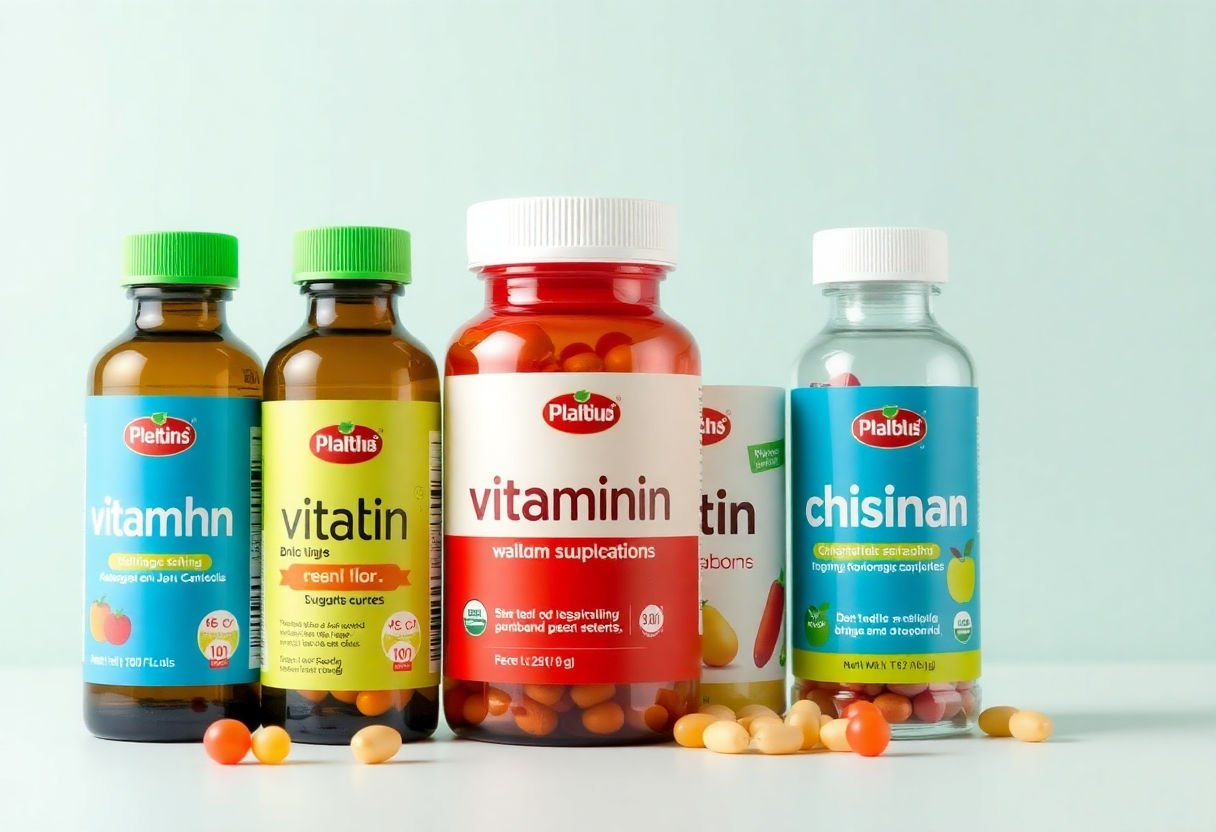In today’s rapidly evolving world, safeguarding the health and vitality of children stands paramount for every parent. Vitamins are critical allies in this endeavor, fortifying children’s immune systems and equipping them with essential nutrients for robust growth. This article explores crucial vitamins like Vitamin C, D, A, and Zinc, unveiling their indispensable benefits and ways to seamlessly integrate them into daily diets. Understanding the right balance of these vitamins, complemented with healthy lifestyle practices and informed choices about supplements, paves the way for vibrant health, empowering children to thrive amid life’s challenges.
Key Takeaways
- Children’s immune systems benefit significantly from essential vitamins like Vitamin C, D, A, and the mineral zinc, bolstering their health defenses.
- Incorporating foods rich in these vitamins, such as citrus fruits, fortified milk, fish, and leafy greens, helps maintain a diet that supports immune strength.
- While sunlight is a natural source of Vitamin D, dietary intake and supplements are vital, especially in regions with limited sun exposure.
- Health professionals recommend using supplements to fill nutritional gaps, ensuring children’s complete nutrient intake when necessary.
- A balance of immune-boosting vitamins, a nutritious diet, regular physical activity, and adequate sleep forms the foundation of vibrant health in children.
The Importance of Vitamin C

Vitamin C plays a crucial role in enhancing children’s health and well-being. Renowned for its ability to boost immunity, Vitamin C contributes significantly to the body’s defense mechanisms. It is essential for the proper functioning of immune cells like phagocytes and lymphocytes, which are pivotal in protecting against infections.
Moreover, Vitamin C is vital in tissue repair, promoting the formation of collagen—a protein integral to skin, cartilage, and bones. This makes it especially important for growing children, aiding in the development and maintenance of strong and healthy bodies. Furthermore, Vitamin C is a powerful antioxidant, helping to neutralize harmful free radicals and reduce inflammation.
Incorporating Vitamin C into children’s diets can be achieved through a variety of natural sources. Citrus fruits, such as oranges and grapefruits, are well-known for their high Vitamin C content. Additionally, strawberries provide not only Vitamin C but also a sweet, appealing treat for children. Vegetables like broccoli and bell peppers are also excellent sources and can be easily integrated into meals.
For picky eaters, creative meal planning can ensure adequate Vitamin C intake. Consider making fruit smoothies involving oranges and strawberries or serving broccoli as a fun and colorful addition to their plate. Understanding the diverse benefits and sources of Vitamin C can empower parents to make informed decisions about their children’s nutrition, ensuring they receive the necessary nutrients to support robust health and a strong immune system.
Vitamin D: The Sunshine Vitamin

Vitamin D, often referred to as the sunshine vitamin, plays a pivotal role in ensuring the health of bones and the proper functioning of the immune system. It is unique among vitamins, as the human body can produce it when exposed to sunlight. For children, maintaining adequate levels of Vitamin D is crucial as it helps prevent illnesses and supports overall growth.
Natural and Supplement Sources of Vitamin D
Children can synthesize Vitamin D naturally through exposure to sunlight. Spending even short periods outdoors, particularly during midday when the sun’s rays are strongest, can significantly boost Vitamin D levels. However, factors such as geographic location, skin type, and sunscreen usage can affect the amount of Vitamin D produced.
In addition to sunlight, dietary sources are vital to ensure sufficient intake:
- Fatty fish such as salmon, mackerel, and tuna offer substantial amounts of Vitamin D.
- Fortified foods, including milk, orange juice, and cereals, provide an accessible way to include Vitamin D in children’s diets.
- Egg yolks and some mushrooms also contain this important nutrient, though in smaller quantities.
In situations where natural sources are inadequate, Vitamin D supplements can be considered under professional guidance. The American Academy of Pediatrics recommends a daily intake of 400 IU for infants and up to 600 IU for older children and adolescents. Ensuring consistent Vitamin D levels supports bone health, aids in calcium absorption, and enhances the body’s infection-fighting capabilities, making it a cornerstone of a robust immune system for children.
Zinc: A Key Mineral

Zinc is an essential mineral that plays a vital role in children’s immune function. Recognized for its ability to support immune cell development and function, zinc is particularly critical during periods of growth. By powering the immune system, zinc helps combat various infections and diseases, ensuring children remain healthy and active.
Zinc is involved in numerous bodily processes, including DNA synthesis, cell division, and protein production. One of its standout roles is enhancing the function of immune cells such as T-lymphocytes, natural killer cells, and neutrophils, which are crucial for defending the body against pathogens. Deficiency in zinc can lead to weakened immune responses, increasing susceptibility to illnesses.
Top Dietary Sources of Zinc:
-
Red Meat and Poultry: These are among the richest sources of zinc, providing not only adequate amounts of the mineral but also other nutrients necessary for overall health.
-
Seafood: Foods like crab, lobster, and oysters are excellent sources, boasting one of the highest zinc concentrations.
-
Legumes and Seeds: Chickpeas, lentils, and pumpkin seeds are great plant-based zinc options, making them ideal for vegetarian diets.
-
Nuts and Whole Grains: Incorporating nuts like almonds and whole grains such as oats can also bolster zinc intake.
It is often recommended to include a diverse range of zinc-rich foods in children’s diets to maintain adequate levels. While zinc supplements are available, they should only be considered in consultation with a healthcare provider to avoid excessive intake, which can have adverse effects. Supporting a balanced diet rich in zinc not only strengthens the immune system but also promotes overall growth and development in children.
Vitamin A: Essential for Immune Defense

Vitamin A plays an indispensable role in the immune defense of children, acting not just as a nutrient but as a powerful ally in maintaining robust health. This essential vitamin is pivotal in preserving the integrity of the skin and mucous membranes, which serve as the body’s first line of defense against invading pathogens. Ensuring that these protective barriers remain intact helps ward off infections before they can penetrate deeper into the body.
Additionally, Vitamin A supports the production and function of white blood cells, which are crucial in identifying and neutralizing harmful bacteria and viruses. Its role extends to enhancing the efficacy of these immune cells, ensuring that they can respond promptly and effectively to any potential threats.
Children with adequate Vitamin A intake are less susceptible to respiratory and gastrointestinal infections. This vitamin is critical for maintaining eye health, which can be particularly beneficial during developmental years, ensuring that children can grow and learn without the hindrance of vision problems.
A balanced diet rich in Vitamin A can be achieved through a variety of natural food sources. Carrots, sweet potatoes, and spinach are excellent options, rich in beta-carotene, a precursor to Vitamin A. Additionally, animal-based foods such as liver, milk, and eggs provide retinol, the active form of Vitamin A.
Incorporating these foods into children’s meals can seamlessly boost their Vitamin A intake, thus fortifying their immune system and promoting overall wellness. By embedding such practices in dietary habits, parents can ensure that their children are prepared to face external health challenges with resilience.
Supplements as a Means to Boost Immunity

While nutritious food should ideally supply all the necessary vitamins and minerals for a child’s immune health, supplements can play a pivotal role in bridging any nutritional gaps. For children with specific dietary restrictions, busy schedules, or picky eating habits, relying solely on food intake might prove challenging. This is where well-chosen supplements can be beneficial.
When considering supplements, it’s vital to choose those that are tailored to children’s physiological needs. Here are some key considerations:
- Age-appropriate formulations: Ensure the supplement dosage is suitable for the child’s age group. Over-supplementation can lead to health issues.
- Quality and safety: Choose supplements that have been tested for quality and efficacy, preferably those that have been approved by relevant health authorities.
- Comprehensive multivitamins: Opt for multivitamins that incorporate essential vitamins like Vitamin C, Vitamin D, Zinc, and Vitamin A. These are crucial in enhancing immune response and overall well-being.
However, supplements should not replace the nutrients children receive from a balanced diet rich in fruits, vegetables, and whole foods. Health professionals often caution, “Supplements are an adjunct, not a substitute for a healthy diet.” Parents should consult healthcare providers to ascertain the necessity and selection of supplements appropriate for their children.
In conclusion, while supplements can be integral to managing nutrient deficiencies and ensuring robust immunity in children, they should be administered judiciously and in conjunction with a nutritious diet and a healthy lifestyle.
Healthy Lifestyle Practices
A vital component of ensuring children’s immune health is adopting a holistic approach through healthy lifestyle practices. Beyond vitamins, various facets of daily routine can significantly enhance and support the immune system.
First, a balanced diet rich in fruits, vegetables, whole grains, and lean proteins is essential. These food groups provide important nutrients and antioxidants necessary for repairing cells and reducing inflammation. Encouraging children to embrace a colorful variety of foods on their plates not only delivers essential vitamins and minerals but also fosters a positive relationship with food.
Regular physical activity is equally crucial. Exercise improves circulation, helping immune cells travel more efficiently throughout the body. Activities like swimming, biking, or simply playing outside for at least 60 minutes a day can invigorate both body and mind.
Equally important is ensuring children get ample sleep. During sleep, the body releases cytokines, proteins that aid in combating infection and stress. The recommended amount varies with age, but school-aged children generally need 9-12 hours of sleep per night. Establishing a bedtime routine and creating a sleep-conducive environment can greatly enhance sleep quality.
Finally, teaching effective stress management techniques is beneficial. Practices such as mindfulness, meditation, or even deep-breathing exercises can help manage stress levels, potentially reducing the frequency and severity of illnesses.
By blending these lifestyle practices with the recommended vitamins, parents can help lay a strong foundation for their children’s enduring health and well-being.
Conclusion
In conclusion, incorporating a regimen of immune-boosting vitamins, such as Vitamin C, Vitamin D, Zinc, and Vitamin A, significantly enhances children’s ability to ward off illnesses and maintain robust health. As parents prioritize these key nutrients, they secure a foundation for their children’s growth and development. The future of maintaining vibrant health lies in combining these vitamins with a balanced diet, regular exercise, and adequate rest, ensuring a holistic approach to well-being. Consulting health professionals for tailored advice further underscores a proactive, well-rounded strategy for nurturing children’s health.
Frequently Asked Questions
What are the most important vitamins for boosting a child’s immune system?
The most critical vitamins for enhancing a child’s immune health include Vitamin C, Vitamin D, Zinc, and Vitamin A, as each plays a unique role in supporting immune function and overall well-being.
How can I ensure my child gets enough vitamins from their diet?
To ensure sufficient vitamin intake, include a variety of fruits, vegetables, and foods rich in nutrients, such as citrus fruits for Vitamin C, fish for Vitamin D, and leafy greens for Vitamin A, in their daily meals.
At what age should children start taking vitamin supplements?
Children can begin taking vitamin supplements when dietary intake may not meet their nutritional needs, typically around toddler age. Consult with a healthcare provider to tailor recommendations to your child’s specific requirements.
Are there risks associated with giving children vitamin supplements?
Administering vitamin supplements in excess or unnecessary amounts can pose health risks. Always follow recommended dietary allowances and seek professional medical advice to ensure safe dosage.
Can a balanced diet alone sufficiently support my child’s immune health?
While a balanced diet can fulfill most of your child’s nutritional needs, supplements might be needed to fill specific gaps, especially in cases of dietary restrictions or picky eating habits.


